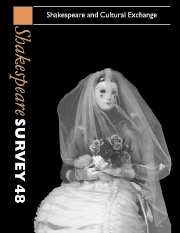Book contents
- Frontmatter
- Shakespeare Translation as Cultural Exchange
- Shakespeare, Theatre Production, and Cultural Politics
- ‘Amphitheaters in the Body’: Playing with Hands on the Shakespearian Stage
- ‘Shakespur and the Jewbill’
- Wilhelm S and Shylock
- Pilgrims of Grace: Henry IV Historicized
- Holy war in Henry V
- Hamlet and the Anxiety of Modern Japan
- Hamlet’s Last Words
- Venetian Culture and the Politics of Othello
- ‘My Music for Nothing’: Musical Negotiations in The Tempest
- The Tempest and Cultural Exchange
- Caliban and Ariel Write Back
- Shakespearian Rates of Exchange in Czechoslovakia 1945–1989
- ‘Are you a Party in this Business?’ Consolidation and Subversion in East German Shakespeare Productions
- The Martyred Knights of Georgian Shakespeariana
- Shakespeare Performances in England, 1993–1994
- Professional Shakespeare Productions in the British Isles, January – December 1993
- 1 Critical Studies
- 2 Shakespeare’s Life, Times, and Stage
- 3 Editions and Textual Studies
- Books Received
- Index
Wilhelm S and Shylock
Published online by Cambridge University Press: 28 March 2007
- Frontmatter
- Shakespeare Translation as Cultural Exchange
- Shakespeare, Theatre Production, and Cultural Politics
- ‘Amphitheaters in the Body’: Playing with Hands on the Shakespearian Stage
- ‘Shakespur and the Jewbill’
- Wilhelm S and Shylock
- Pilgrims of Grace: Henry IV Historicized
- Holy war in Henry V
- Hamlet and the Anxiety of Modern Japan
- Hamlet’s Last Words
- Venetian Culture and the Politics of Othello
- ‘My Music for Nothing’: Musical Negotiations in The Tempest
- The Tempest and Cultural Exchange
- Caliban and Ariel Write Back
- Shakespearian Rates of Exchange in Czechoslovakia 1945–1989
- ‘Are you a Party in this Business?’ Consolidation and Subversion in East German Shakespeare Productions
- The Martyred Knights of Georgian Shakespeariana
- Shakespeare Performances in England, 1993–1994
- Professional Shakespeare Productions in the British Isles, January – December 1993
- 1 Critical Studies
- 2 Shakespeare’s Life, Times, and Stage
- 3 Editions and Textual Studies
- Books Received
- Index
Summary
Who is the mysterious dramatist who has shot to world-wide fame in our century because of his political relevance? His plays were performed before the incipiently fascist public in France and the actually fascist public in Germany during the 1930s, and he was acclaimed for his vigorous portrayal of the dangers of mob rule and the need for strong leadership, as well as for his awareness of the ineradicable enmity between Christian generosity and the Jewish fixation on money. At some point during the war he appears to have moved to England, since he wrote a film script for Laurence Olivier depicting the courage and resourcefulness of the English when fighting on the continent, and was much praised for his patriotism. After the war, his series of plays on English history showed the desirability of hereditary monarchy and the dangers of civil war; but after the student uprisings of 1968 he appears to have treated revolution much more sympathetically. His taste for a deliberately antiquated style and archaic diction lends (paradoxically) a sharpness to his critique of contemporary politics; his passion for anonymity and seclusion has kept biographers guessing, and has fascinated the public; and his obvious wanderlust has enabled him to exert an influence in every major country in the world.
There is some uncertainty even about his name: it has come to us in various spellings, and there are even theories that this was not his name at all, but that of an actor whom the dramatist used to disguise his true identity. Since in this essay I intend to discuss the anti- Semitic play he wrote when in Nazi Germany, I shall use the German form of his given name, and avoid all orthographical controversy by abbreviating his surname: I shall call him Wilhelm S. Although we cannot be sure that he was actually German, there is no doubt about the great success he enjoyed there.
- Type
- Chapter
- Information
- Shakespeare Survey , pp. 61 - 68Publisher: Cambridge University PressPrint publication year: 1996

